Zoom
Trash

Buddhism and the Brain. Credit: Flickr user eschipul Over the last few decades many Buddhists and quite a few neuroscientists have examined Buddhism and neuroscience, with both groups reporting overlap.
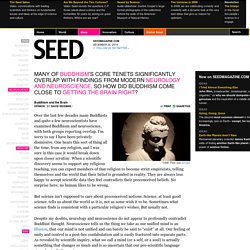
I’m sorry to say I have been privately dismissive. One hears this sort of thing all the time, from any religion, and I was sure in this case it would break down upon closer scrutiny. When a scientific discovery seems to support any religious teaching, you can expect members of that religion to become strict empiricists, telling themselves and the world that their belief is grounded in reality. They are always less happy to accept scientific data they feel contradicts their preconceived beliefs. But science isn’t supposed to care about preconceived notions. Despite my doubts, neurology and neuroscience do not appear to profoundly contradict Buddhist thought.
Buddhists say pretty much the same thing. Mr. Although I despaired, I comforted myself by looking at the overlying cortex. The next day Mr. Detecting covert consciousness in the vegetative state. I've written a news story for New Scientist about a recent study which shows that patients in the minimally conscious state may be capable of dreaming, and that studying the brain wave patterns associated with sleep could be helpful in distinguishing minimally conscious patients from those in the vegetative state.
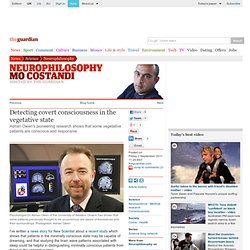
Accurate diagnosis of these mysterious conditions can help relatives make difficult decisions, because minimally conscious patients are more likely than vegetative ones to show some degree of recovery. Diagnosis can be difficult, however, and up to 40% of patients are diagnosed wrongly. It had been thought that vegetative patients were completely unaware of their surroundings, but this view began to change about five years ago, following the publication of a landmark 2006 study led by Adrian Owen. 10% of the Brain Myth. Let me state this very clearly:
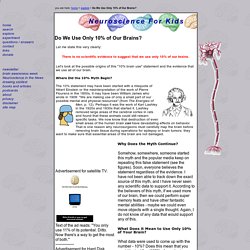
Neurological Control - Neurotransmitters. Neurotransmitter Molecules Neurotransmitters can be broadly split into two groups – the ‘classical’, small molecule neurotransmitters and the relatively larger neuropeptide neurotransmitters.
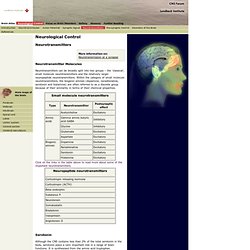
Within the category of small molecule neurotransmitters, the biogenic amines (dopamine, noradrenaline, serotonin and histamine) are often referred to as a discrete group because of their similarity in terms of their chemical properties. Click on the links in the table above to read more about some of the important neurotransmitters. Serotonin Although the CNS contains less than 2% of the total serotonin in the body, serotonin plays a very important role in a range of brain functions. 5 Ways To Hack Your Brain Into Awesomeness. Much of the brain is still mysterious to modern science, possibly because modern science itself is using brains to analyze it.
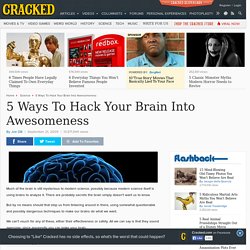
There are probably secrets the brain simply doesn't want us to know. But by no means should that stop us from tinkering around in there, using somewhat questionable and possibly dangerous techniques to make our brains do what we want. We can't vouch for any of these, either their effectiveness or safety. All we can say is that they sound awesome, since apparently you can make your brain... #5. Etymology of Neuroscience Terms. MSNBC - How to Think About the Mind. How to Think About the MindNeuroscience shows that the 'soul' is the activity of the brain Sept. 27 issue - Every evening our eyes tell us that the sun sets, while we know that, in fact, the Earth is turning us away from it.
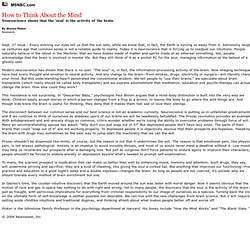
Astronomy taught us centuries ago that common sense is not a reliable guide to reality. Today it is neuroscience that is forcing us to readjust our intuitions. People naturally believe in the Ghost in the Machine: that we have bodies made of matter and spirits made of an ethereal something. Yes, people acknowledge that the brain is involved in mental life. Modern neuroscience has shown that there is no user. This resistance is not surprising. The disconnect between our common sense and our best science is not an academic curiosity. Why sleep? UCLA scientist delves into one of science's great mysteries.
By Mark WheelerAugust 20, 2009Category: Health Sciences, Research Bats, birds, box turtles, humans and many other animals share at least one thing in common: They sleep.
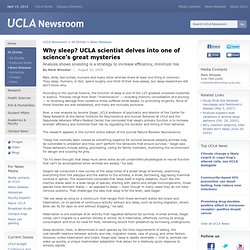
Humans, in fact, spend roughly one-third of their lives asleep, but sleep researchers still don't know why. Introduction to Neurogenesis. Live Longer and Prosper by Doing the Opposite of What You’ve Heard: Maybe Read this First. The claim that stress can shorten your life isn’t necessarily true, according to researchers at UC Riverside.
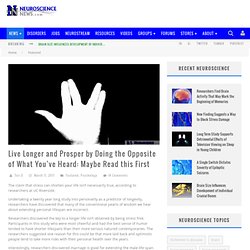
Undertaking a twenty year long study into personality as a predictor of longevity, researchers have discovered that many of the conventional pearls of wisdom we hear about extending personal lifespan are incorrect. Researchers discovered the key to a longer life isn’t obtained by being stress free. Participants in this study who were most cheerful and had the best sense of humor tended to have shorter lifespans than their more serious natured contemporaries. The researchers suggested one reason for this could be that more laid back and optimistic people tend to take more risks with their personal health over the years.
Interestingly, researchers discovered marriage is good for extending the male life span. Hard work also factored into extending life spans. PTSD Peaks in Women Aged 51 55 and Men Aged 41 45 - Post Traumatic Stress Disorder. New research shows that Post-traumatic stress disorder (PTSD) peaks in men between the ages of 41-45 and in women between the ages 51-55.
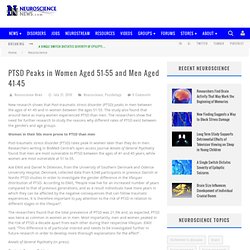
The study also found that around twice as many women experienced PTSD than men. The researchers show the need for further research to study the reasons why different rates of PTSD exist between the genders and age groups. Women in their 50s more prone to PTSD than men Post-traumatic stress disorder (PTSD) rates peak in women later than they do in men. Decreased Neural Inhibition Makes Decision Making Harder For The Anxious. New psychology research from CU-Boulder suggests that “neural inhibition” is a critical component in our ability to make choices.
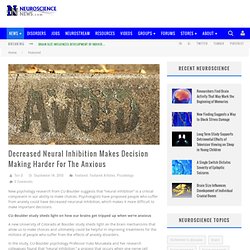
Psychologists have proposed people who suffer from anxiety could have decreased neuronal inhibition, which makes it more difficult to make important decisions. Welcome to Test yourself?